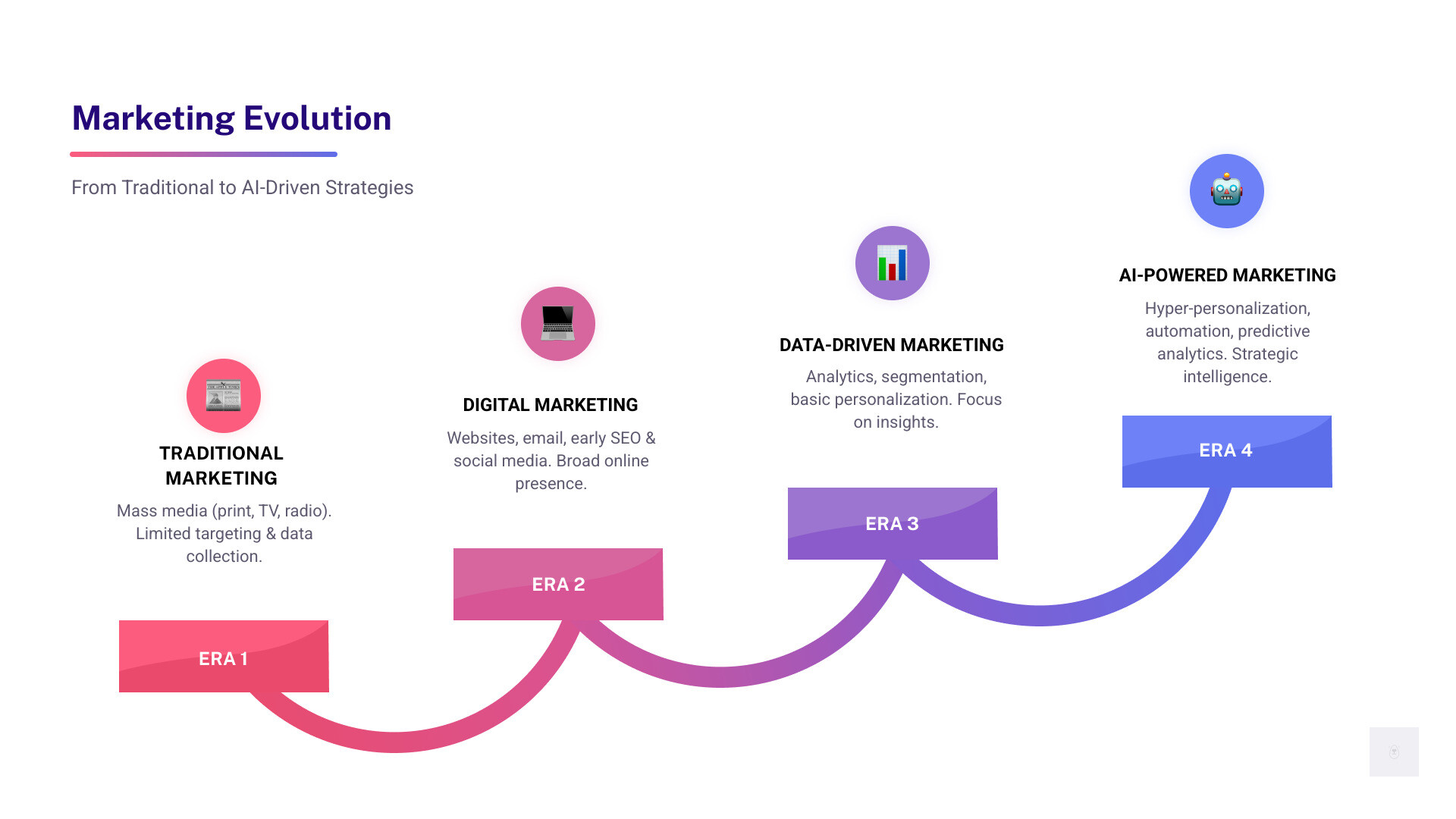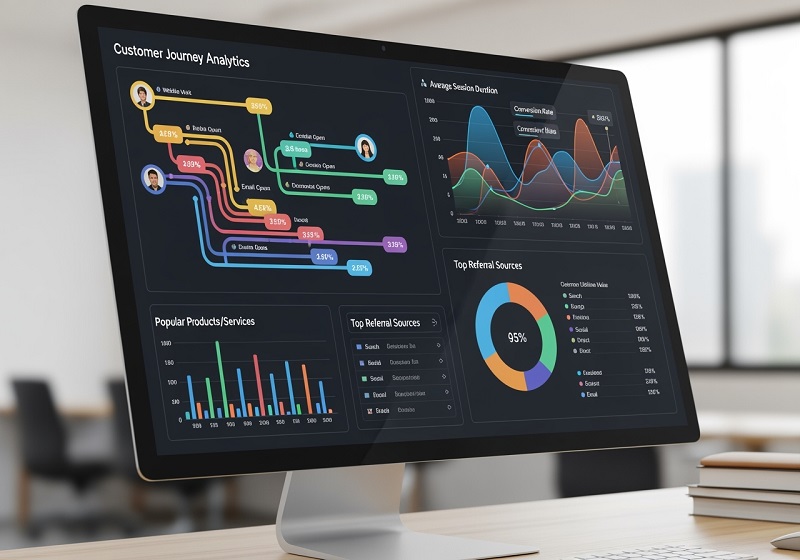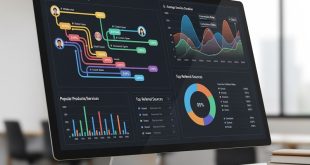Introduction: The Dawn of AI-Powered Marketing
The digital marketing landscape is undergoing a rapid change. Artificial Intelligence (AI) is no longer a futuristic idea; it’s now a vital part of our daily work. In fact, many marketers say they “couldn’t live without AI” in their current roles. We believe AI is reshaping how we connect with target audiences and achieve our business goals.
This shift means new opportunities for efficiency, personalization, and deeper customer understanding. AI helps us analyze vast amounts of data, create compelling content, and manage campaigns with unprecedented precision. It allows us to move from reactive strategies to proactive, predictive ones.
In this guide, “AI Marketing 101,” we will explore the core applications of AI in modern marketing. We’ll look at key tools, emerging trends, and how businesses can leverage AI for advanced analytics and hyper-personalization. We will also address the important ethical considerations and challenges that come with this powerful technology. Our goal is to help you steer this exciting new era and prepare for the future of AI-driven marketing. For a comprehensive look at how AI is revolutionizing the industry, we invite you to explore a Data-driven AI marketing guide.

Core Applications of AI in Modern Marketing
AI is rapidly becoming the backbone of modern marketing, driving unprecedented levels of automation and efficiency across various tasks. From streamlining routine operations to enhancing creative output, AI tools are empowering marketing teams to achieve more with less. This technological integration allows us to dedicate more time to strategic thinking and less to repetitive, manual processes. The result is a more agile, responsive, and ultimately, more effective marketing strategy.
AI’s impact spans critical areas such as content generation, customer service, and advertising optimization. It enables us to automate complex workflows, analyze vast datasets in real-time, and deliver highly targeted messages. This shift is not just about doing things faster; it’s about doing them smarter, leading to improved customer experiences and stronger brand loyalty. The ability of AI to learn and adapt continually ensures that our strategies remain relevant and impactful in an ever-changing digital environment.
The Rise of Generative AI in Content Creation
Generative AI has revolutionized content creation, moving beyond simple automation to produce original and engaging material at scale. These advanced models can generate a wide array of content, including blog posts, social media updates, email copy, video scripts, and even images. By taking in huge amounts of raw, unstructured data, generative AI performs millions of “fill-in-the-blank” exercises, learning to predict the next element in a sequence, and thereby crafting coherent and contextually relevant content. This capability helps marketers keep up with the internet’s incessant demand for fresh content, significantly reducing the time and resources traditionally required for content production.
For businesses, especially those in specialized sectors like home services, generative AI offers incredible potential. It can help create localized content, answer common customer queries, and even draft detailed service descriptions. For a deeper dive into integrating AI for content, particularly for home service business owners, consider our guide on Integrating AI in Content Creation: A Guide for Home Service Business Owners. We’ve also seen how AI can dramatically streamline content creation processes, freeing up human creativity for strategic oversight and refinement.
Automating Customer Engagement and Service
AI is changing customer engagement and service by providing advanced chatbots and virtual assistants that can handle a wide range of customer queries, recommend products, and even complete transactions in real-time. These AI-powered tools go beyond traditional “one-to-one” customer service, enabling a “one-to-many” approach where support is provided to numerous customers simultaneously, across different time zones. This 24/7 availability significantly improves customer satisfaction and streamlines support operations.
Beyond basic query resolution, AI assists in lead qualification and nurturing. By analyzing customer interactions and behaviors, AI can prioritize potential customers based on their likelihood to convert, enabling sales teams to focus on the most promising leads. This intelligent lead management is crucial for businesses aiming to optimize their sales funnels. For home service companies, AI can significantly simplify lead management in home services, ensuring that inquiries are handled efficiently and effectively, turning potential customers into loyal clients.
Optimizing Digital Advertising
Digital advertising has been one of the most successful areas to adopt AI, leveraging its power for precise targeting, budget optimization, and real-time performance analysis. AI algorithms can analyze vast amounts of user data—including demographics, interests, online behavior, and purchase history—to identify the most receptive audiences for specific ad campaigns. This allows for hyper-targeted advertising that minimizes wasted ad spend and maximizes return on investment.
AI also plays a critical role in programmatic advertising, automating the buying and selling of ad space in real-time. This includes dynamic bid adjustments based on performance metrics, audience response, and market trends. By continuously monitoring and optimizing campaigns, AI ensures that ads are displayed to the right people, at the right time, and on the right platforms. This capability helps businesses refine audience segmentation and identify emerging opportunities by quickly analyzing data to gain deeper insights into consumer behavior, predicting emerging trends and adjusting messages in real time.
The Power of Data-driven AI Digital Marketing
At the heart of AI’s transformative power in marketing lies its unparalleled ability to collect, process, and analyze vast quantities of data. This data-driven approach allows us to move beyond assumptions and base our strategies on concrete insights into customer behavior, preferences, and market trends. AI can mine both easily searchable information like names, purchase histories, and website interactions, as well as unstructured data such as images, videos, and social media posts. This comprehensive analysis provides a holistic view of the consumer, enabling us to craft marketing experiences that are not only effective but also make customers feel seen and valued.
The integration of AI with CRM and big data technologies further amplifies this capability. When combined, these systems maximize the collection of user information from different platforms, gaining accurate insights for target customers and identifying user needs. This allows companies to determine the most appropriate marketing strategy, visualize customer journeys, and predict future actions with remarkable accuracy. This predictive power is a game-changer, allowing us to anticipate customer preferences and customize marketing to individual needs before they even express them.
Achieving Hyper-Personalization at Scale
Hyper-personalization takes traditional personalization to an entirely new level, tailoring customer experiences based on an extensive range of data points. This includes not just browsing history and past purchases, but also behavioral signals like mouse movements, engagement times, and even emotional responses inferred from interactions. This granular level of data analysis, powered by AI, allows us to create truly unique and relevant experiences for each individual customer.
The benefits are substantial: personalized campaigns powered by AI can boost conversion rates by up to 30%, as advanced algorithms help brands deliver highly targeted content. By understanding individual preferences, AI enables dynamic content delivery, customized product recommendations, and custom messaging that resonates deeply with the consumer. This level of AI-driven personalization helps us build more authentic connections with our audience, significantly increasing both engagement and brand loyalty. We’ve seen how AI-driven websites improve conversion rates by offering these deeply personalized experiences.
Predictive Analytics for Proactive Strategies
AI’s predictive analytics capabilities are invaluable for developing proactive marketing strategies. By integrating historical sales data, market trends, and consumer buying patterns, AI can anticipate demand, manage inventory, optimize supply chain operations, and even predict future customer behavior. This foresight allows businesses, from large corporations to small enterprises, to stay one step ahead, adjusting their strategies in real-time to capitalize on emerging opportunities and mitigate potential risks.
One of the key applications of predictive analytics is lead scoring, which helps businesses prioritize potential customers based on the likelihood they will make a sale. This is particularly beneficial for sales teams, allowing them to focus their efforts on high-potential leads. For businesses looking to expand their customer base, AI can be instrumental in boosting leads for AI home service businesses and even for specialized sectors like lead generation for pest control businesses with AI. These tools provide the insights needed to target the right customers with the right message at the opportune moment.
Advanced Customer Segmentation with Data-driven AI Digital Marketing
AI significantly refines audience segmentation, moving beyond broad demographics to identify precise, actionable data points that reveal deeper insights into consumer behavior. By quickly analyzing vast amounts of data, AI can uncover micro-trends and subtle preferences that would be impossible for human analysts to detect manually. This allows for the creation of highly granular customer segments, enabling marketers to tailor messages and offers with unprecedented accuracy.
The ability to mine unstructured data, such as images, videos, and social media posts, further enriches our understanding of brand perception and shopping trends. This comprehensive data collection, combined with CRM integration, allows us to maximize the collection of user information from different platforms. The result is a more precise and actionable understanding of target customers, helping us identify their needs and determine the most appropriate marketing strategies. This advanced segmentation is crucial for delivering truly personalized and effective campaigns.
Emerging Trends and the Evolution of Search
The digital landscape is in constant flux, and AI is a primary driver of its evolution, particularly in how users find information and engage with brands. We are witnessing a significant shift in search behavior, moving away from traditional keyword-based queries towards more conversational and visual interactions. This change necessitates a proactive approach from marketers to stay ahead of the curve, adapting strategies to new platforms and AI-powered search experiences.
Emerging trends indicate that AI will continue to reshape search, making it more intuitive, personalized, and integrated into daily life. From optimizing for AI-powered search engines to understanding the nuances of voice and social search, marketers must accept these changes to maintain visibility and relevance. This evolution underscores the need for continuous learning and adaptation, ensuring that our marketing efforts align with how consumers actually interact with digital information.
From SEO to GEO: Optimizing for AI-Powered Search
The traditional landscape of Search Engine Optimization (SEO) is undergoing a profound change, giving rise to what we call Generative Engine Optimization (GEO). With AI-powered search experiences like Google AI Overviews and the integration of search capabilities into large language models such as ChatGPT, the way users find information is fundamentally changing. Gartner predicts traditional search traffic will drop by 25% by 2026, highlighting the urgency for marketers to adapt.
Optimizing for GEO means moving beyond keywords to focus on providing direct, concise, and authoritative answers to conversational queries. Content needs to be structured to be easily digestible by AI models, often in summary form, and capable of being synthesized into AI-generated responses. This shift requires a deep understanding of user intent and the ability to craft content that not only ranks but also serves as a reliable source for AI systems. We’ve explored how AI is reshaping search with AI responses and the implications of Google SGE for generative AI and small businesses. The impact of SGE on HVAC, plumbing, and electrical businesses further illustrates the need for industry-specific adaptation.
The Growth of Voice and Social Search
Beyond traditional search engines, AI is fueling the rapid growth of voice and social search, fundamentally altering how consumers find products and services. Voice assistants like Alexa, Google Assistant, and Siri are becoming ubiquitous, with 51% of voice shoppers using them to research products, and 22% making direct purchases. This trend means optimizing content for conversational queries is essential, structuring information to answer specific questions with concise, authoritative responses.
Simultaneously, social media platforms like TikTok and Instagram are evolving into powerful search engines, especially for younger audiences. Users are increasingly turning to these platforms to find trends, products, and local businesses. This shift demands a new approach to content strategy, focusing on engaging, short-form video, and visually rich content that performs well within these social search ecosystems. AI plays a crucial role in analyzing these trends, helping marketers create content that resonates with social search behaviors.
AI’s Role in Strategic Decision-Making
AI is becoming an indispensable ally in strategic decision-making for marketers, providing unparalleled capabilities in market research, competitive analysis, and trend prediction. It can process and synthesize vast amounts of market data, identifying patterns and insights that would be impossible for human analysts to uncover. This includes everything from consumer sentiment to competitor strategies, enabling businesses to make data-informed decisions with greater efficiency and accuracy.
The ability of AI to forecast future trends allows marketers to anticipate shifts in consumer behavior and market dynamics, enabling proactive adjustments to campaigns and product development. This foresight helps us allocate budgets more effectively and focus resources on the most promising opportunities. For instance, understanding how to prepare an HVAC marketing strategy with AI or how Spring marketing for HVAC companies leverages AI demonstrates how AI empowers businesses to tailor their strategies to specific seasonal and industry needs, ensuring maximum impact.
Navigating the Challenges and Ethical Landscape
While the benefits of AI in digital marketing are undeniable, its widespread adoption also introduces important challenges and ethical considerations that demand careful navigation. We recognize that the responsible and ethical use of this technology is paramount to building trust with consumers and ensuring the long-term sustainability of AI-driven strategies. These challenges range from safeguarding data privacy and addressing algorithmic bias to understanding the environmental impact of AI and the need for continuous human oversight.
It’s crucial for marketers to not only leverage AI’s capabilities but also to develop a robust framework for its ethical application. This involves being transparent with consumers about AI’s role, establishing clear accountability for AI-generated outputs, and actively working to mitigate potential harms. By proactively addressing these concerns, we can harness the full potential of AI while upholding our commitment to responsible marketing practices.
Upholding Data Privacy and Security
Data privacy stands as one of the most significant ethical considerations in AI-driven marketing. AI’s effectiveness relies heavily on access to vast amounts of personal data, which necessitates stringent adherence to privacy regulations such as GDPR and CCPA. Marketers must ensure that data collection, storage, and processing practices are transparent, secure, and compliant with all relevant laws. This includes obtaining explicit user consent and providing clear information about how data is used to personalize experiences.
The potential for misuse and abuse of AI, particularly concerning sensitive consumer information, highlights the need for robust security measures and ethical guidelines. Building consumer trust requires a commitment to protecting their data and using AI in ways that respect their privacy. This means being vigilant about data breaches, implementing privacy-by-design principles, and continually auditing AI systems to ensure they do not inadvertently expose or exploit personal information.
Addressing Algorithmic Bias and Ensuring Fairness
Algorithmic bias is another critical challenge in AI marketing, stemming from the fact that AI models learn from the data they are trained on. If this data reflects existing societal biases or lacks diversity, the AI’s outputs and decisions can perpetuate or even amplify those biases. This can lead to unfair or discriminatory targeting, content, or recommendations, alienating segments of the audience and damaging brand reputation.
To combat algorithmic bias, we must actively work to ensure that the data sets used to train AI models are diverse and representative. Regular auditing of AI systems is essential to identify and rectify any biased outcomes. Furthermore, establishing clear accountability frameworks for AI decisions and prioritizing fairness in algorithm design are crucial steps toward building equitable AI marketing practices. The goal is to create AI systems that serve all consumers fairly and without prejudice.
The Indispensable Human-AI Partnership
Despite the increasing sophistication of AI, the human element remains indispensable in digital marketing. AI functions best as an intelligent assistant, augmenting human capabilities rather than replacing them. Human oversight is crucial for ensuring the accuracy, relevance, and ethical integrity of AI-generated content and decisions. Marketers bring the creativity, strategic thinking, empathy, and cultural nuance that AI currently lacks, ensuring that campaigns resonate authentically with target audiences.
The future of AI-driven marketing is not about AI versus humans, but rather a powerful human-AI partnership. This collaboration allows AI to handle repetitive, data-intensive tasks, freeing up human marketers to focus on higher-level strategy, creative ideation, and building meaningful customer relationships. For home service professionals, leveraging AI can significantly cut stress and save time in 6 ways, allowing them to focus on core business operations and customer satisfaction. Understanding how to leverage AI for home service companies is key to maximizing this partnership’s potential.
Frequently Asked Questions about AI in Digital Marketing
As AI continues to integrate into our marketing workflows, many questions arise about its practical implementation, impact on careers, and measurement of success. Here, we address some of the most common inquiries to provide clarity and guidance.
How can small businesses start using AI in their marketing?
Small businesses can begin by identifying specific pain points where AI can offer immediate value, such as content creation, social media scheduling, or customer service chatbots. Start with readily available, user-friendly AI tools that integrate with existing platforms. Focus on automating repetitive tasks to free up time for strategic activities. Prioritize areas like personalized email campaigns or basic data analysis to gain insights into customer behavior. Investing in learning resources and experimenting with different tools will be key to finding what works best for your specific needs. Even for specialized businesses, AI can contribute to efficiency and profitability, as detailed in our guide on how to build the ultimate 20 net profit HVAC company.
Will AI completely replace human marketers?
No, AI is not expected to completely replace human marketers. Instead, it will redefine roles and responsibilities. AI excels at data analysis, automation, and generating content drafts, but it lacks the nuanced creativity, strategic thinking, emotional intelligence, and ethical judgment that human marketers possess. The future lies in a collaborative human-AI partnership, where AI handles the heavy lifting of data processing and repetitive tasks, allowing marketers to focus on high-level strategy, creative direction, brand storytelling, and building authentic customer relationships. Marketers who learn to effectively leverage AI tools will be highly sought after.
How do you measure the ROI of Data-driven AI Digital Marketing?
Measuring the ROI of AI in digital marketing involves tracking key performance indicators (KPIs) that align with your business objectives. This can include increased conversion rates, reduced customer acquisition costs, improved customer lifetime value, improved engagement rates, time savings from automated tasks, and more accurate sales forecasts. It’s crucial to establish baseline metrics before implementing AI and then compare post-implementation results. Attribution models powered by AI can also help pinpoint which AI-driven initiatives are contributing most to revenue. By continuously testing, analyzing, and iterating, we can refine AI strategies to maximize their return on investment.
Conclusion: Embracing the AI-Powered Future
The journey into AI-driven digital marketing is not merely an adoption of new tools; it’s a fundamental shift in how we approach strategy, execution, and customer engagement. We’ve explored how AI is changing every facet of our work, from generating compelling content and automating customer interactions to hyper-personalizing experiences and predicting future trends. The benefits are clear: increased efficiency, deeper insights, and the ability to deliver unparalleled value to our audiences.
While navigating the ethical considerations of data privacy and algorithmic bias is crucial, the opportunities presented by AI far outweigh the challenges. The most successful marketing teams of tomorrow will be those that accept a strategic implementation of AI, fostering a culture of continuous learning and collaboration between human creativity and artificial intelligence. By doing so, we can open up new levels of performance, drive significant business outcomes, and truly prepare for the dynamic and exciting future of AI-powered marketing.
 Entrepreneur Resources Your source for small business information
Entrepreneur Resources Your source for small business information





